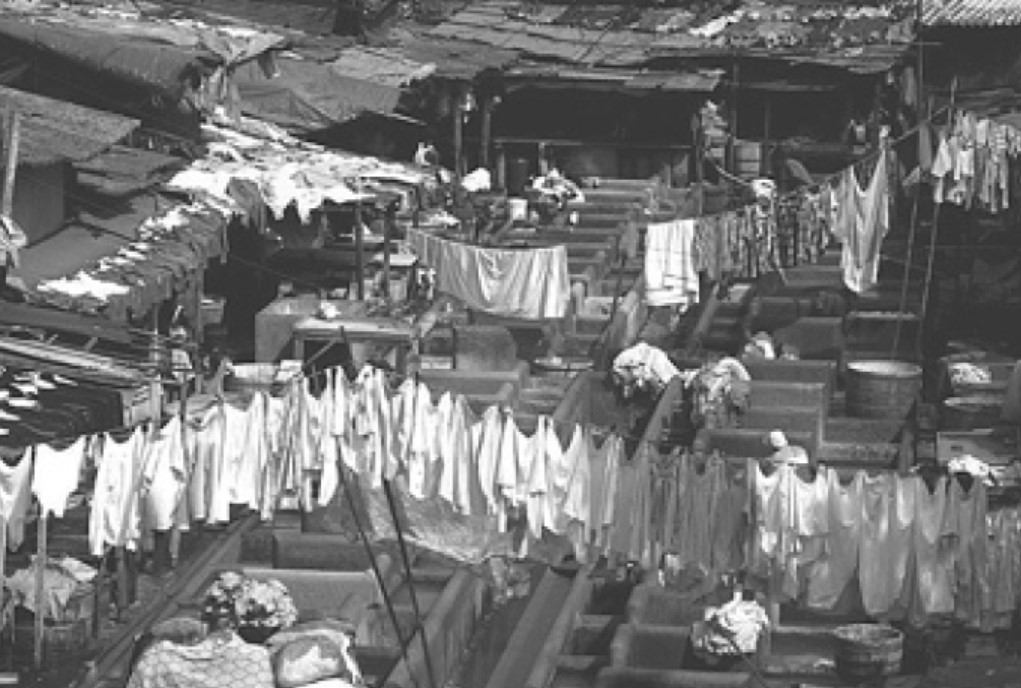For many people doing laundry barely registers on the radar screen; it requires little effort, other than loading and unloading a washing machine and dryer, be it at home or in a laundromat. For the rich it involves no effort at all; their maids do the laundry.
But imagine being homeless. If that is your unlucky fate, having a place to stay, let alone owning a washing machine is but a distant dream, and staying clean and well-groomed is a constant challenge. The homeless have little or no access to laundry facilities.
Now, take a leap in space to Bombay (now called Mumbai). A sprawling metropolis with some 16 million inhabitants, it is home to some of the world’s largest slums. In the slums the small dwellings– sometimes mere shacks–of the poor are huddled together, pell-mell in a rabbit warren of narrow alleys.
There too washing one’s clothes and staying clean is a daily struggle. But, at least, the slum dwellers have a place to stay and a modicum of privacy; surprisingly there are very few truly homeless people in Bombay.
Bombay also has a wealthy middle and upper class, including several billionaires, not to mention countless Bollywood movie stars. Those people are so well off that they don’t even think about laundry, let alone do it.
Their maids and servants attend to all their needs, laundry included. Bombay also has numerous hotels, including some of the world’s finest and most expensive, among them the Taj Mahal and Oberoi hotels that were partly destroyed in brutal attacks in November last year.
Whereas in Washington and other big cities hotels do their laundry—sheets, towels and tablecloths—in house, in Bombay hotels send out their washing to the strangest of places, the Dhobi Ghat.

Some Bombay residents also send their laundry there. In Hindi Dhobi means washer man, and a ghat (which means ‘landing’) is a place by the water, usually a stepped embankment that leads to the water’s edge. India has countless rivers and innumerable ghats.
Take, for instance, Benares, one of the world’s oldest cities. It stretches along a crescent of the Ganges, India’s most sacred river.
The city has several ghats where pilgrims come to bathe and do their ablutions.
There are also two cremation ghats, where bodies are burnt in huge funeral pyres, before their ashes are strewn in the river. Not surprisingly the waters of the holy Ganges are far from clean.
But that is beside the point. Bombay’s Dhobi Ghat couldn’t be more different. It isn’t on a river and one can’t swim there.
On the contrary, this, the world’s largest open-air laundry, stretches along one of the city’s busiest railway lines. It has no natural supply of water; all the water is pumped in.

The ghat is the home of Bombay’s dhobis, a couple hundred families that live and work there. The dhobis are among the city’s poorest and their work is grueling.
By night they live in miserable shacks. By day they do laundry in concrete wash pens that are filled to the brim with soapy water. Standing in the pens, knee-deep in the water, the men stomp on the laundry before pounding it on flagstones.
After rinsing, the laundry is hung to dry on what looks like miles of clotheslines, then pressed, folded and returned to the various hotels. The work is backbreaking, standing in water all day long takes its toll on the dhobis’ health, and they earn but a pittance for doing it.
For westerners the Dhobi Ghat is a sight to behold. Hordes of tourists flock to it, cameras in hand. Somewhat bemused, the dhobis can’t figure out why their time-honored work causes so much curiosity.
But the greatest mystery is that, at the end of the day all the laundry—thousands of sheets, towels, tablecloths and individual garments–gets back to the right place.
Much like at dry-cleaners, it is done by marking each item. Each hotel has its own distinctive indelible mark. That way nothing gets lost.
Eugene is retired World Bank economic who worked on micro-financing issues. He is current an active Street Sense volunteer.




